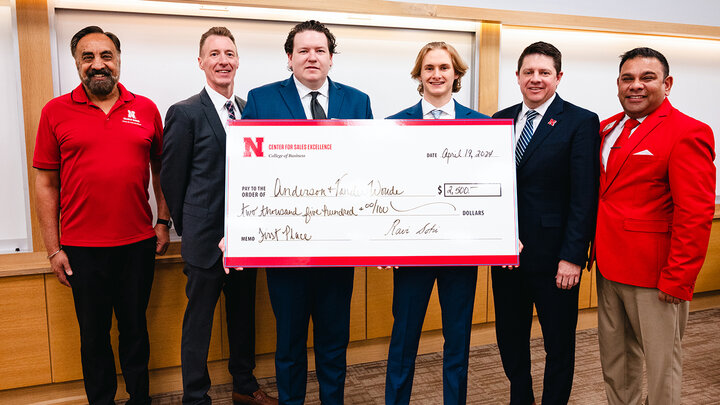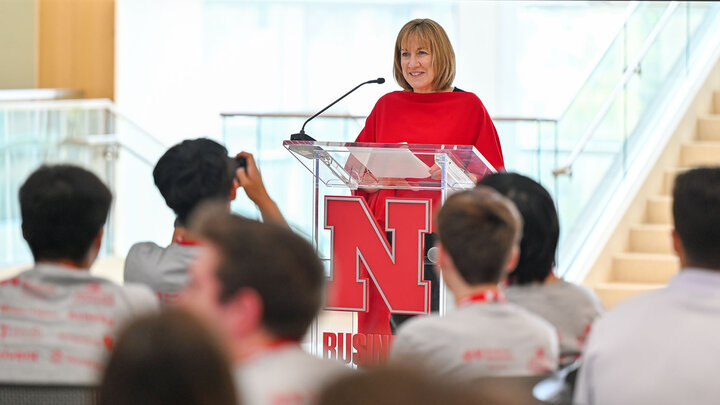Accredited by AACSB and HLC
One of 17 charter members of the Association to Advance Collegiate Schools of Business in 1916, the College of Business is accredited in both business and accounting. Less than 1 percent of business schools worldwide have earned AACSB accreditation for both business and accounting.
AACSB initially accredited Nebraska in business in 1916 and accounting in 1984, and most recently reaccredited in 2021. This achievement demonstrates the quality of faculty, relevant and challenging curriculum, and educational and career opportunities found at Nebraska Business.
The University of Nebraska-Lincoln has held accreditation through the Higher Learning Commission (HLC) since 1913, with its most recent affirmation in the 2016-17 academic year.
Learn More About AACSB Learn More About the HLC
Assurance of Learning
Nebraska Business utilizes a rigorous assurance of learning (AoL) process to ensure continued achievement and improvement on the learning goals and objectives established for each program.
Undergraduate Programs
| Bachelor of Science in Business Administration (BSBA) | ||
|---|---|---|
| Learning Goal | Learning Objective | Measures/Data Source |
| Students are engaged in self-discovery and reflection. | Students actively engage in their personal and professional learning and growth. |
|
| Students are adaptive and innovative thinkers. | Students apply diverse ideas and global perspectives to solve problems. |
|
| Students apply analytical and critical thinking skills to solve problems. |
| |
| Students are skilled communicators. | Students effectively communicate knowledge and ideas through writing. |
|
| Students speak effectively in various business contexts. |
| |
| Students are capable, qualified business professionals and future business leaders. | Students demonstrate competency in business knowledge, ethics and skills. |
|
| Additional Learning Outcomes for the BSBA in Accounting | |
|---|---|
| Learning Goal | Measures/Data Source |
| Interpersonal and Communication Skills - Writing |
|
| Interpersonal and Communication Skills - Presentations |
|
| Accounting Knowledge |
|
| Critical Thinking and Analytical Skills |
|
| Ethics |
|
Graduate Programs
| MBA | ||
|---|---|---|
| Goals | Outcomes | Assessed |
| Competent Communicators | (1) Produce high quality written business documents |
|
| (2) Deliver constructive feedback to a peer |
| |
| Analytical Problem Solvers | (3) Formulate recommendations based upon financial analysis |
|
| (4) Forecast and formulate recommendations based on data analysis |
| |
| Collaborative | (5) Effectively work as a part of a team |
|
| Ethical Decision-Makers | (6) Apply ethical frameworks to business scenarios |
|
| MPA | |
|---|---|
| Goals | Class Assessed |
| Interpersonal and Communication Skills - Writing |
|
| Interpersonal and Communication Skills - Presentations |
|
| Accounting Knowledge |
|
| |
| Critical Thinking and Analytical Skills |
|
| Ethics |
|
| M.S. Actuarial Science | ||
|---|---|---|
| Goals | Outcomes | Assessed |
| Knowledgeable in applications of the theory of interest | Solve applied and theoretical problems relating to present value, current value, and accumulated value |
|
| Knowledgeable in models used in financial economics | Solve applied and theoretical problems related to some of the models used in financial economics |
|
| Knowledgeable about the fundamentals of life and health insurance | Understand the economic functions of life insurance; the basic forms of contemporary life insurance, annuities, and health insurance; basic life insurance pricing; insurance company operations; and contractual provisions of insurance |
|
| Knowledgeable in applications of long-term actuarial models | Solve applied and theoretical problems related to long-term actuarial models |
|
| Knowledgeable in applications of short-term actuarial models | Solve applied and theoretical problems related to short-term actuarial models |
|
| Knowledgeable in actuarial applications of statistical data analysis | Apply statistical data analysis techniques to solve estimate certain actuarial quantities of interest |
|
| M.S. Business Analytics | ||
|---|---|---|
| Goals | Outcomes | Assessed |
| Skilled at analyzing and interpreting data | Analyze and interpret data in support of business decision-making |
|
| Analytical problem solvers | Apply appropriate quantitative methods to model and solve business problems |
|
| Knowledgeable about relevant tools and algorithms | Learn software, computer languages and algorithms for data analysis and decision-making |
|
| Competent communicators | Produce high written business documents that effectively and professionally communicate analysis, results and recommendations |
|
| M.S. Finance | |
|---|---|
| Goals | Assessment |
| Skilled in quantitative analysis |
|
| Analytical problem solvers |
|
| Knowledgeable about the structure of the financial sector and regulatory environment |
|
| Knowledgeable about the ethical issues in finance |
|
| M.A. Economics | ||
|---|---|---|
| Goals | Objectives | Assessment |
| Knowledgeable in applied and theoretical microeconomics | Solve applied and theoretical microeconomic problems |
|
| Knowledgeable in applied and advanced macroeconomics | Solve applied and theoretical macroeconomic problems |
|
| Knowledgeable in applied and theoretical econometrics | Apply econometric theory to problems |
|
| Produce applied econometric research |
| |
Doctoral Programs
| Ph.D. |
|---|
| Number of Students who: |
| Have manuscripts under journal review |
| Have publications |
| Have publications on summer journal list |
| Made conference presentations |
| Graduated and placed at universities |
| Graduated and placed at firms |
Student Success
Nebraska Business regularly collects and reviews data regarding our students. Frequent assessment highlights the achievements and growth of our College while helping to identify areas for future development.
Points of Pride Awards Post-Graduation Success




